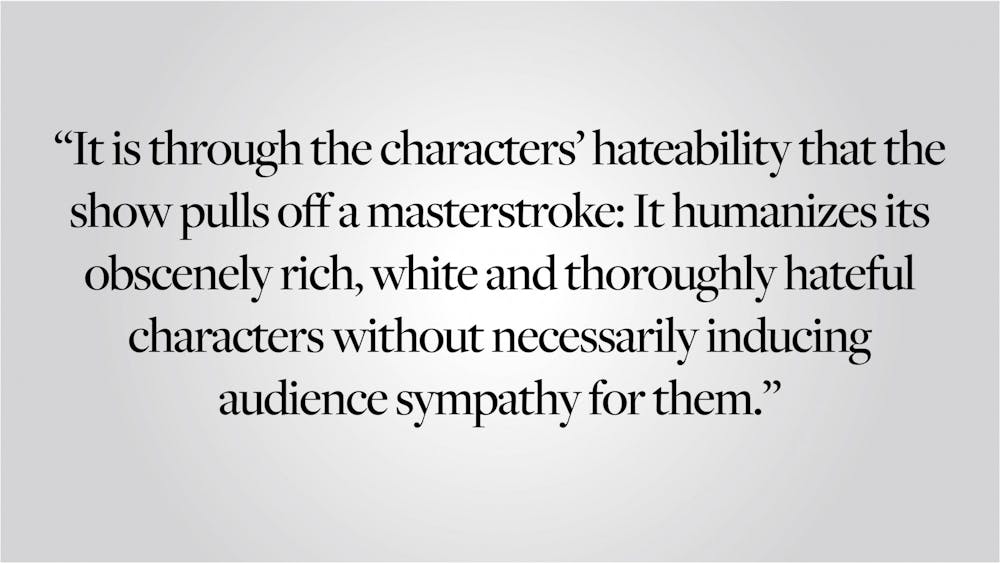“Succession,” HBO’s critical darling of a TV show that returned with a third season two weeks ago, is about members of the fictitious Roy family struggling for control over their media company. A year ago, I wrote a column about the second season of “Succession,” describing it as a “hugely enjoyable hate watch” due to its impeccable, profanity-laden writing. But though the writing has stayed top-notch in the third season, I would no longer consider the show to be a simple hate watch — it’s better. “Succession” is really about just two things: power and close relationships, which become sources of manipulation and trauma due to the cast’s insatiable hunger for power. Viewers of the show have long remarked that every character is a terrible person. There are no healthy relationships in “Succession” either, as every character is bent on manipulating each other to gain power for themselves. It is through the characters’ hateability that the show pulls off a masterstroke: It humanizes its obscenely rich, white and thoroughly hateful characters without necessarily inducing audience sympathy for them.
“Mass in Time of War,” the second episode of the third season of “Succession,” is a uniquely good example of the show’s broken relationships, subverting our understanding of how TV shows normally work. Most scenes in “Succession” feature nothing more than groups of characters talking in rooms, but this episode utilizes that setup more than most. One of the four Roy siblings, Kendall, is planning to take over the family company by usurping his father, the all-powerful patriarch and CEO, Logan Roy. In the central scene, Kendall attempts to convince his three siblings — two of whom are also gunning to succeed their father yet remain firmly under his control — to join him in his revolt.
In most TV shows, it is not uncommon for characters to come together by realizing their shared struggles and attempt to overthrow an oppressive power structure. If “Succession” was a typical show, this is exactly what would have happened: The four siblings would realize how growing up under their tyrannical father traumatized them and band together to take him down. And there are moments within the episode where it seems like that sort of an alliance might be possible. But then, two things happen. First, Kendall asserts that he would want to be CEO in any takeover scenario, which is a no-go for his two siblings who also want the top spot. This, too, reflects how Logan has traumatized his children: He has instilled the notion in them that becoming CEO of the family company is the only valuable pursuit in life, branding his kids with blind ambition.
Second, there is a box of doughnuts. Logan, who is not supposed to be aware that the four siblings are meeting, sends them an innocent box of doughnuts with a seemingly benign note wishing them a nice tea party (evoking the Boston Tea Party in 1773). The siblings are divided over whether or not the doughtnuts are poisoned, and whether they should eat them. The doughnuts are Logan’s power play, a way of telling his children that he is watching at all times. All it took to destroy a budding sibling alliance was a box of sweet treats, again flying in the face of standard television plotlines, where solidarity among characters typically can survive minor obstacles — particularly those as minor as a box of doughnuts. The episode ends with Kendall’s three siblings running back to Daddy, at least for the time being.
For the four Roy siblings, growing up in a world where being power-hungry was the only way to earn their father’s attention and love irrevocably damaged them. They know of no relationship that cannot be exploited and manipulated for power, manifesting in a complete inability to find common ground. But it does not make them any less human, or any less desiring of love. In a scene in the middle of the second episode, one of the siblings, Shiv, and her husband Tom have a quick discussion, in which Shiv tells Tom she loves him. When Tom is slow to respond, Shiv asks, “And … do you love me too?” To which he responds, “Why do you want to know?” then declares, “You can’t just take my love and bank it and then take it to the love market and see if you want to invest in me.” These two characters are married and ostensibly care for each other. It is easy to see that they want to love and be loved. But as their discussion makes clear, real, non-transactional love is not possible in the Roy family.
The attempt to humanize the characters in “Succession,” however, does not distract from their genuine horribleness. The four siblings are obviously deeply traumatized, but they are unable to handle it in a healthy way. Even if “Succession” shows how much they desire human connection, they do not earn audience sympathy. Indeed, the media conglomerate they all seek to take over is responsible for the spread of rampant misinformation, yet none have any moral qualms about it. The show is obsessed with portraying things the way they are, not how they should be, and the way it exposes both the humanity and brokenness of its wealthy and powerful characters reflects that. Its ability to depict how money and power erode close relationships is what makes the show the best thing on television.
Bliss Han ’23 can be reached at bliss_han@brown.edu. Please send responses to this opinion to letters@browndailyherald.com and op-eds to opinions@browndailyherald.com.





